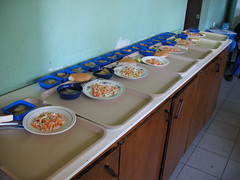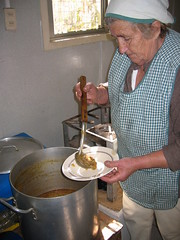Three women and me
16 May 2006
11:00 AM
This is the first article in the Work Week series.
I work Tuesdays at the comedor in Calle Larga. Catholic parishes throughout Chile run comedores abiertos, open soup kitchens where anyone can stop by for a lunchtime meal. Ours currently serves about 30 people daily, Monday through Friday. The number fluctuates with the days and seasons. During the summer, when temporary work in the grape harvest is plentiful, the comedor isn’t even open. During the winter, when money is scarce and the weather miserable, the numbers get as high as 40 people.
I arrive at 11:00am. I greet the trio of boisterous women who run the operation, Adela, Terecita, and Graciella. They call me gringuito, “little gringo.” I am bigger than all of them (well, at least vertically). Sometimes it seems that my job is to be there just as much to entertain them as other more useful things. I don’t mind, since I figure that they work every day to cook for the daily crowd. In truth, I don’t really have a choice, either. Most of my entertainment value comes from the fact that I don’t understand them. They talk in slangy Chilean and make double entendres, which I of course don’t get. (This is a story for another time, but double entendre represent about 95% of Chilean humor.) Then, they look at me waiting to see if I got it. I tell them that I didn’t, and then they laugh. What can I say—I’m gifted with humor like that.
In terms of actual work, I’m not a crucial gear in the whole operation. I’m really not even a moderately important lever. I just add a little grease to the machine while I’m there. This metaphor in action means that I set the dining room tables, place food on trays for serving, reload returned trays, and wash dishes. Sometimes my responsibility is increased more when Adela, the head honcho, tells me “Cut more bread!” or “Stir the stew!”

At noon, the kitchen opens for an hour of operation. Patrons know to come at this time through word-of-mouth and fliers posted throughout the parish. One at a time people come to the serving door, where someone (occasionally me) writes the person’s first name and accepts his payment. The parish asks for 150 pesos a lunch to help with the operating costs—about 30 cents. This gets you a small salad, bread, a main dish (usually a stew or pasta of some kind), and a dessert. In contrast, I ate lunch in Los Andes last week and a small hamburger with a drink cost me 1500 pesos, about $3. On a side note, I’m interested in the psychology effect of asking for a small payment in exchange for lunch. I get the impression that people like the feeling of providing their own means to eat, however small the token amount may be.
By 1:00pm, lunch traffic has slowed to a halt. Then we eat lunch ourselves, wash dishes, clean up the dining room, and close the kitchen for the day. This usually happens by 2:30pm. And then, onward with Tuesday.


Comments